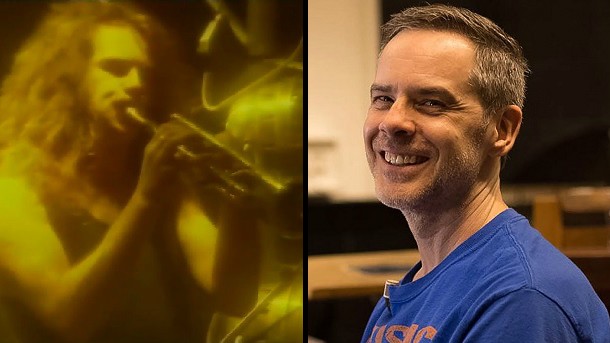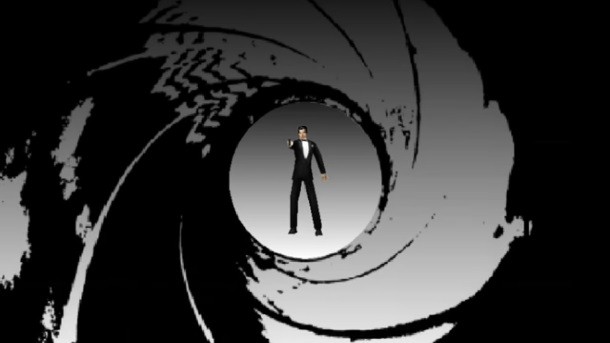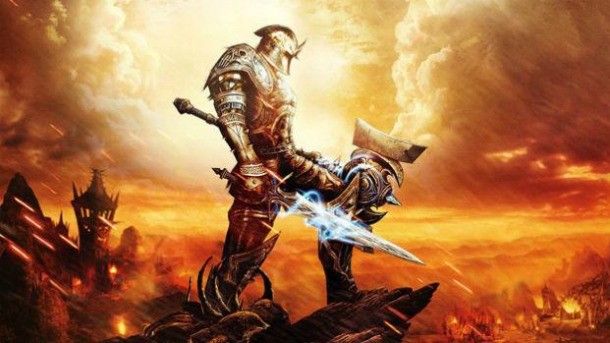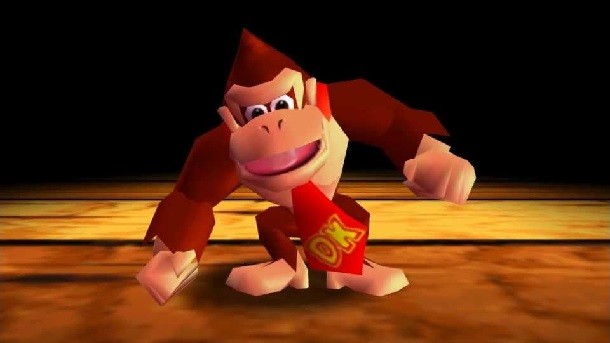From GoldenEye To Yooka-Laylee: Grant Kirkhope Reflects On His Career

If you’ve been a gamer for any length of time, Grant Kirkhope’s tunes have probably been stuck in your head at some point. His music defined some of the Nintendo 64’s greatest games, such as GoldenEye and Banjo-Kazooie – the latter being the direct inspiration for his latest project, Playtonic’s Yooka-Laylee.
Kirkhope spoke to us about his decades in the industry and his plans for the future, and offered his veteran words of wisdom to young composers. “You get to that point where people call you a veteran just because you’ve been doing it for a long time, like you’re old. Yes, I’m an old person!” Even at 54 and with 20 years of video game composition under his belt, Kirkhope remains exuberant, humble, and dedicated to the music.

A Big Bad Horn
Born in Edinburgh, Scotland, Kirkhope graduated from the prestigious Royal Northern School of Music with a major in classical trumpet; despite his classically-trained skills, he self-identifies as a straight-up metalhead. In the 1980s/early ‘90s, Kirkhope’s biggest claim to fame was as the trumpet player for The Big Bad Horns, the backing band to Scottish rock group Little Angels, which let him brush shoulders with plenty of famous rock stars.
“They were quite big. They had a #1 album at the time, so we went on some pretty big tours, a lot of arena gigs. We toured with Van Halen, Bon Jovi, Bryan Adams, and ZZ Top. Getting to play with Van Halen was fantastic. And Eddie was a really genuinely nice guy. When he gave me the guitar, I could have fallen through the floor. I couldn’t believe it. I would have been happy with a plectrum [guitar pick], you know what I mean? He gave the whole band a guitar each. I look at it every day and go… ‘Eddie Van Halen handed me that guitar.’ It’s incredible. It’s awesome.”

Paying His Dues
Grant first started working at Rare in 1995, after being suggested by his friend Robin Beanland, but he didn’t start composing right away:
“For Killer Instinct 2, Robin wanted to get a guitar player, and that was part of the reason they hired me. I played guitar on the metal tracks on KI2, and I did trumpet as well, because I was a classically trained trumpet player. Robin wrote it all, but I played on it.”
After Killer Instinct, Kirkhope received his first full assignment, Donkey Kong Land 2, for which he was tasked with converting David Wise’s original SNES score down to the comparably meager specs of the Game Boy.
“The Game Boy had three channels. You could play one note on each channel, and one note was a noise channel, for drum beats and sound effects all stuck together. You had one note for a melody, the middle note was forced to imply the harmony, and the bottom note was the bass, and that was it. It was my first job, so I was happy to do it, but it was a bit tricky.”
When we asked David Wise about Kirkhope’s work on Donkey Kong Land 2, he heaped praise on the man tasked with the herculean task of bringing his cutting-edge SNES score to the significantly underpowered Game Boy:
“Grant did a top job! It was a huge challenge, especially for, at the time, a rookie video game composer. He had to take someone else's tunes and make strategic decisions about how best to emulate them on a hardware device that was compromised by comparison. With no previous experience of writing and getting the best out of the GB, it was a huge challenge by anyone’s standards, so a very impressive start at Rare.”

From Bond To Banjo
After completing work on Killer Instinct 2 and Donkey Kong Land 2, Kirkhope scored his first original game; GoldenEye (co-composed by Graeme Norgate) is now recognized as an all-time classic and one of the greatest games ever made, but nobody at Rare could have predicted the level of universal acclaim the genre-defining N64 shooter would achieve.
“GoldenEye had a slow start (and) was a slow burner. When people got to the multiplayer, it became this great big thing. The whole first-person shooter world-changing event happened. We didn’t expect it. We were all massive Bond fans, so we really put a lot of love into it. For me to get to use the Bond theme tune was just such a fantastic thing. I had so much fun doing it, trying to figure out different ways to use it all the time.”
For GoldenEye, Kirkhope infused 007’s iconic themes and instrumentation with his hard-rock upbringing to create a unique sound:
“We had bought a double CD of the pop songs from all the Bond movies. I listened to that all the time. I picked up bits that got stuck in my head, you know, so I just like, put in the things I liked and hoped for the best! I was new at Rare, I didn’t really know what I was doing. In Frigate, I used my version of the “We Care A Lot” drum beat. I love Faith No More, so I nicked that. And then I took a bit from A View To A Kill, put that in there, and Goldfinger. For Cradle (another GoldenEye track), the riff was from one of the bands I was in years ago. It’s called "No Absolution". I was like, ‘It would sound cool if I stuck it in GoldenEye,’ so...”

Grant’s humble nature is at direct odds with the mileage he was able to get from the constrained Nintendo 64 hardware. Take, for example, the crunchy guitar riff of the main 007 theme, which plays during GoldenEye’s attract screen:
“That was me playing guitar. Memory was so tiny on an 8-megabit N64 cartridge. So, it worked out that the actual Bond theme tune, you could play it from about three phrases. So we cut it, because if we did it as one long phrase, then we couldn’t fit it in the memory. So we cut it into bits, and rearranged it a little bit, so we could play all of it with only two or three samples.”
Kirkhope would use a similar approach when assembling the iconic “gibberish speak” from Banjo- Kazooie:
“What I did was, I got people to make single-syllable noises. And then I found the ones that I thought sounded best, and put them in the game. It would pick a random pitch between a certain value, and pick up the samples at random each time it went to play. That was it. At the time, we all thought it sounded so terrible, we were like, ‘People are gonna’ hate us for this!’ Back in those days, whatever you needed to do, you just did it, and that was it. Rare was the kind of place where nothing was off-bounds.”

Rolling With The Punches
Over the following years, Grant composed for titles like Banjo-Tooie, Perfect Dark, Viva Piñata, and Banjo-Kazooie: Nuts and Bolts, before leaving Rare and joining the ill-fated Big Huge Games, which collapsed after the failure of the would-be blockbuster fantasy RPG, 2012’s Kingdoms of Amalur: Reckoning:
“It was part of that whole Curt Schilling 38 Studios disaster. It’s unfortunate that he bought our company, Big Huge Games. BHG knew that the big thing they were doing was going to crash at some point, but we were hoping that we would get out from beneath it just in time. We didn’t. We had a deal on the table from somebody else to do Reckoning 2, but the whole Curt Schilling thing crashed, and it was just all gone.”
Grant doesn’t look upon the experience with regret, however; he credits the game, a fully -American production, with moving him to the U.S. full-time. Kirkhope lives in southern California with his family and, on March 15, became a citizen of the United States.

Freelancing And The Future
In the past couple of years, Kirkhope, no longer with Rare or the defunct Big Huge Games, has transitioned to being a freelance composer, lending his talents to games as varied as Yaiba: Ninja Gaiden Z, Civilization: Beyond Earth, and Yooka-Laylee, to say nothing of his first motion picture, the live-action mermaid fairy tale, The King’s Daughter, starring – of all people – Pierce Brosnan:
“It’s funny, I’m writing for Pierce Brosnan again after writing for him with GoldenEye back in the day. You have to watch scenes over and over again when you’re scoring, and I just kept seeing Pierce Brosnan on the screen all the time, because he plays Louis XIV.”
Kirkhope’s signature has been his flexibility, from soothing, earthy scores like Banjo-Kazooie and Yooka-Laylee, to a heavy metal take on James Bond, to the cyberpunk stylings of Perfect Dark, and the grandiose orchestral arrangements of Kingdoms of Amalur:
“When I meet young composers, I tell them, ‘Say ‘yes’ to everything.’ Whatever you get asked to do, even if you don’t know, just do it. Just say, ‘I do it all the time, I’m great at that!’ The more variety, the better, provided you can do it. I’m not certain I can do all of it, but I try.”

Bigger, Faster, And Stronger Too
For many gamers, the first thing that comes to mind when they hear Kirkhope’s name is the iconic DK Rap. The campy tune played during the intro screen to Donkey Kong 64 and became legendary for its cringe-worthy rhymes and adorably innocent nature. After resurfacing in Super Smash Bros. Melee, the DK Rap beat the odds, becoming an endearing hit among Nintendo fans, so much so that Yooka-Laylee has its own successor to the song, the aptly named GK Rap.
“Doing the DK Rap was good fun, but I took a lot of flak for it. Everybody hated it back in the day! They all thought I was trying to make a credible stab at rap music. I’m useless at rap, so I made a jokey rap about monkeys eating bananas and grapes and all that stuff, and they’re like, ’Grant is trying to be serious with his rap music,’ and I’m like, ‘Are you joking?’ It’s taken 15 years for people to like it. Someone sent me video, of room was full of people chanting the DK Rap, and I was just like, I was honestly, genuinely in tears. I was crying watching it. I couldn’t believe it. I think, to be remembered for anything I write is an amazing thing. I think that’s really special.”
For more on Grant Kirkhope, check out his 2015 appearance on the Game Informer Show. For more on the music of Yooka-Laylee, read our interview with Kirkhope and the game's other composers, David Wise and Steve Burke.

Get the Game Informer Print Edition!
Explore your favorite games in premium print format, delivered to your door.
- 10 issues per year
- Only $4.80 per issue
- Full digital magazine archive access
- Since 1991









